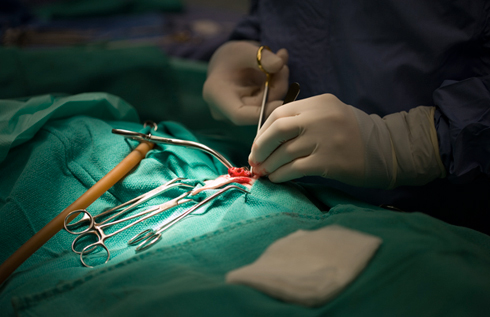
ABOUT THE DEPARTMENT OF SURGERY ACADEMIC STAFF
The Department of Surgery deals with the medical, conservative, and operative treatments of surgical diseases in animals. Specifically, it plays a crucial role in providing initial emergency care for the patient, treating various accidents and injuries, and managing traumatic lesions of the skeletal system, such as fractures and dislocations. The department also intervenes in cases requiring aesthetic and reconstructive surgery and applies operative techniques when conservative and medical treatments are ineffective or when a definitive diagnosis cannot be established.
Veterinary Faculty students are introduced to surgical studies through the "Introduction to Clinics" course and continue with mandatory courses like Anesthesiology, Radiology, General Surgery, and Specialized Surgery, thereby gaining essential knowledge and skills needed by a veterinary surgeon. In addition to theoretical courses, students participate in clinical practice, scheduled extramural practices, farm and mobile clinic services, night and weekend shifts, and internships, which provide them with hands-on experience in diagnosing and treating surgical diseases in small animals, farm animals, sports horses, and some exotic animals. In their final year, students who choose the Small Animal Medicine or Farm Animal Medicine and Breeding module are also offered elective courses tailored to specific animal species.
The Surgery Clinic operates as two separate sub-units: Small Animal and Large Animal Clinics. The Anesthesiology and Resuscitation and Radiology units serve all clinics. Research activities are also conducted alongside regular clinical work. Prominent topics in small animal orthopedics and traumatology include osteosynthesis methods using various implants, external fixation, and hip prostheses, all focused on bone healing in traumatic skeletal diseases. Soft tissue surgery focuses on urinary system surgery and diseases of the eyes, ears, and teeth. Additionally, emergency care, analgesia, thoracic surgery, and reconstructive surgery are priority areas. Thanks to modern endoscopic equipment, diagnosis and treatment are seamlessly integrated for both small and large animals. The primary research areas in the Large Animal Clinic include locomotor system diseases in cattle and tendon diseases in sport horses. Developmental diseases such as hip and elbow dysplasia in dogs are also screened in our clinic and evaluated on behalf of the German Shepherd Dog Breed and Sport Club.
The surgery clinic, which provides health services 24/7, cares for approximately 1,300 patients each year. Most cases brought to the Small Animal Clinic for surgical issues or referred by general practitioners are cats, dogs, and, in recent years, an increasing number of exotic pets. In the hospitalization unit, all necessary care for patients is provided during pre- and post-operative periods, including treatment for animals brought from distant areas. Due to its local characteristics, Uludağ University's Veterinary Surgery Clinic treats a wide range of animal species and also attends to the surgical needs of animals in the Bursa Zoo and ostrich farms in the surrounding area. The clinic provides diagnostic support to private veterinarians for both small and large animals, especially through imaging diagnostic methods. The Department of Surgery maintains a close dialogue with the State Farms and the Turkish Jockey Club, frequently participating in both theoretical and practical in-service training programs.